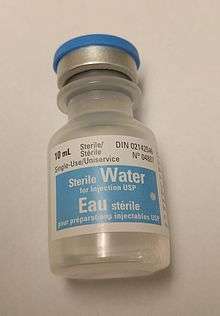Water for injection
Water for injection is water of extra high quality without significant contamination.[1] A sterile version is used for making solutions that will be given by injection.[2] Before such use other substances generally must be added to make the solution more or less isotonic.[3] It can be given by injection into a vein, muscle, or under the skin.[4] A non-sterile version may be used in manufacturing with sterilization occurring later in the production process.[5]
 Sterile water for injection | |
| Clinical data | |
|---|---|
| AHFS/Drugs.com | FDA Professional Drug Information |
| License data | |
| ATC code | |
| Identifiers | |
| CAS Number | |
| ChemSpider | |
| Chemical and physical data | |
| Formula | H2O |
If it is given by injection into a vein without making it more or less isotonic, breakdown of red blood cells may occur.[3] This can then result in kidney problems.[3] Excessive amount may also result in fluid overload.[4] Water for injection is generally made by distillation or reverse osmosis.[5] It should contain less than a mg of elements other than water per 100 ml.[5] Versions with agents that stop bacterial growth are also available.[5]
It is on the World Health Organization's List of Essential Medicines, the safest and most effective medicines needed in a health system.[6] Water for injection is available over the counter.[3] The wholesale cost in the developing world is about US$0.03–0.15 per 10 ml vial.[7] In the United Kingdom this amount cost the NHS 0.25 to 1.40 pounds.[8]
Other names
Aqua ad iniectabilia or aqua ad injectionem
References
- "<1232> Water for Pharmaceutical Purposes" (PDF). hmc.usp.org. p. 2. Archived (PDF) from the original on 11 March 2015. Retrieved 14 January 2017.
- WHO Model Formulary 2008 (PDF). World Health Organization. 2009. p. 493. ISBN 9789241547659. Archived (PDF) from the original on 13 December 2016. Retrieved 8 January 2017.
- "Sterile Water for Injection - FDA prescribing information, side effects and uses". www.drugs.com. Archived from the original on 18 January 2017. Retrieved 14 January 2017.
- "Water for Injection - FDA prescribing information, side effects and uses". www.drugs.com. Archived from the original on 18 September 2017. Retrieved 14 January 2017.
- Ghosh, Tapash K.; Jasti, Bhaskara R. (2004). Theory and Practice of Contemporary Pharmaceutics. CRC Press. p. 396. ISBN 9780203644478. Archived from the original on 16 January 2017.
- World Health Organization (2019). "World Health Organization model list of essential medicines: 21st list 2019". World Health Organization (WHO). hdl:10665/325771. Cite journal requires
|journal=(help) - "Water for Injection". International Drug Price Indicator Guide. Retrieved 8 December 2016.
- British national formulary : BNF 69 (69 ed.). British Medical Association. 2015. p. 685. ISBN 9780857111562.
External links
- Inspection Technical Guides Water for Pharmaceutical Use
- Guideline on the quality of water for pharmaceutical use (EMA, European Medicines Agency)
- "Water for injection". Drug Information Portal. U.S. National Library of Medicine.